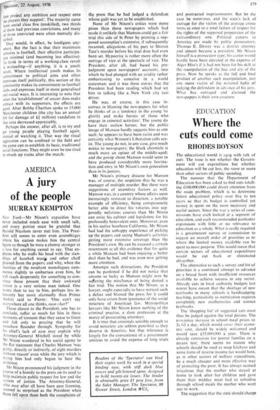AMERICA
A jury of the people
MURRAY KEMPTON
New York—Mr Nixon's capacities have never included much ease with small talk, and every patriot must be grateful that Harold Nicolson never met him. The Presi- dent still seems to enter even assemblages where his station makes him the central figure as though he were a clumsy stranger at a loss for anything casual to say. That ex- plains why he stuffs his head with the stan- dings of baseball teat* and other chaff gleaned from the papers; and why, when the inanities of the resultant monologues com- mence slightly to embarrass even him, he will reach desperately for something to con- vince those present that their awkward visitor is a very serious man indeed. One wants then to say to him, perhaps less in- timately but more alarmedly than Prince Andrei said to Pierre: 'One can't say everywhere all one thinks, mon cher?'
Those closest to the President, one has to conclude, suffer so much for him in these moments of torment that they cease to listen and fall only to praying that he will somehow flounder through. Sympathy for his chief's lack of ease may explain why Attorney-General Mitchell stood by while Mr Nixon wandered in his social agony to the flat statement that Charles Manson 'was guilty, directly or indirectly, of eight murders without reason' even while the jury which is trying him had only begun to hear the evidence.
Mr Nixon pronounced his judgment in the course of a homily to the press on its need to help maintain public respect for law and the system of justice. The Attorney-General, who may after all have been past listening, seemed as surprised as the President when there fell upon them both the complaints of
the press that he had judged a defendant whose guilt was yet to be established.
None of Mr Nixon's critics were more pious than those newspapers which had made it unlikely that Manson could get a fair trial this side of St Peter by printing a sup- posed accomplice's extensive, if subsequently recanted, allegations of his part in Sharon Tate's murder before his trial date had even been set. Hypocrisy is rather more often the outrage of vice at the spectacle of vice. The President, after all, had based his pre- judgment upon newspapers' accounts, into which he had plunged with an avidity rather embarrassing to conceive in a world statesman; and it was these stories that the President had been reading which had set him to talking like a New York city taxi driver.
He was, of course, in this case in- correct in blaming the newspapers for what he thinks of as a tendency in the young `to glorify and make heroes of those who engage in criminal activities'. The young do have their outlaw heroes, but the public image of Manson hardly suggests him as one such; he appears to have been racist and was certainly what Women's Liberation calls sex- ist. The young do not, in any case, give much notice to newspapers; the black chronicle is much more an opiate of the middle-aged; and the gossip about Manson would seem to have produced considerably more fascina- tion and envy in Mr Nixon's own generation than in its juniors.
Mr Nixon's primary distaste for Manson was, of course, the suspicion that he was a manager of multiple murder. But there were suggestions of secondary factors as well. Manson was, in a country whose affairs seem increasingly resistant to direction, a notable example of efficiency, being conspicuously better able to direct his votaries into sup- posedly nefarious courses than Mr Nixon can unite his cabinet and legislature for his professedly benevolent ones. Moreover, even in his native Southern California, Mr Nixon had had the unhappy experience of picking up the papers and seeing Manson's activities getting more extensive coverage than the President's own. He can be excused a certain resentment at all this evidence that for quite a while Manson had been enjoying a better deal than he had, and was even now getting more attention.
Amongst such distractions, the President can be pardoned if he did not notice that anyone so lucky as Manson might now be suffering the mischance of being denied a fair trial. The notion that Mr Nixon, as a lawyer, ought especially to have noticed such a defect and blamed the press for it could only have arisen from ignorance of the social structure of American law. Metropolitan lawyers like Mr Nixon know nothing of the criminal practise, a slum profession at the mercy of prosecuting attorneys.
It is true that criminals sensible enough to avoid notoriety are seldom punished as they deserve in America; but that tolerance is largely for the convenience of a government anxious to avoid the expense of long trials
and protracted imprisonments. But let the case be notorious, and the state's lack of outrage for the victim of the average crime turns at once to a total failure of respect for the rights of the supposed perpetrator of the extraordinary one. Political careers in America are made by public prosecutors: Thomas E. Dewey was a district attorney and almost became a president. Mr Nixon himself is a prosecutor type: his career would hardly have been elevated at the expense of Alger Hiss's if it had not been for his skill at the manipulation of the hue and cry of the press. Now he speaks as the full and final product of another such manipulation, just one more victim of the national habit of judging the defendant in advance of his jury. What has outraged and alarmed the newspapers is their own creature.






























 Previous page
Previous page